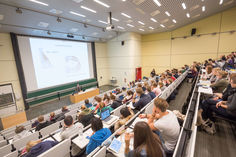General Information on Genetic Counselling
Tasks:
- Genetic counselling
- Concilar services and consultation hours for special counselling
Genetic counselling is a medical service offered to everyone with a congenital malformation or hereditary disease and to those who fear that they or their children could be affected by such a disorder.
The counselling service comprise:
- Establishment of a patient's records including the complete medical history (anamnesis)
- Establishment of a record of the complete medical history of the family back to the grandparents' generation (family tree)
- Information on general genetic risks as well as the calculation of the particular genetic risk in question
- Detailed information on the specific given handicap, defect or disease
- Information on the possibilities, limitations and risks of prenatal tests for the purpose of family planning or in the case of an existing pregnancy
- On an individual basis, we offer a physical examination if necessary
- When indicated and if practicable, a blood sample for more extensive laboratory tests to clarify the problem in question
- When necessary for further clarification, referral to other departments/services of the University Hospitals
What happens during a genetic counselling session?
Appointments for the Outpatient Clinic can be made in writing or by telephone.
There, an extensive consultation with one of the clinic's specially trained physicians takes place and in some cases, more than one appointment may be necessary. If a specific diagnosis has already been made, the risk of recurrence can be exactly calculated for you or your children and is expressed as a percentage. These figures always reflect the likelihood of an event's recurrence. Even if the risk of recurrence of a particular disorder, handicap or defect is calculated to be low, it does not mean that you can exclude the possibility that it might occur nonetheless.
In cases where the presented disorder or malformation are not clearly defined, efforts are made to make a diagnosis through comparison with other cases and reference to specialised literature. Therefore, it is possible that we can only estimate the risk of recurrence in unclear cases.
Who is eligible for genetic counselling?
Both families and individuals can consult the Outpatient Clinic
- if they are personally affected by a hereditary disease or think they may be
- if their child is born with a hereditary disorder or malformation, or if there is suspicion of it
- if hereditary disorders have occurred in close family members or are suspected to have occurred
- if they and their partners are related to each other
- if parents want information on risks involved when the woman (mother) is beyond a certain age and/or wish to get information on prenatal diagnostic services
- in cases where prior to or during pregnancy external factors (infections, radiotherapy, medications, chemicals) may have effected them or the child
- if they are considering artificial insemination in cases where natural family planning had not been successful
- in cases of repeated miscarriage
Appointments for the Outpatient Clinic can be made in writing or by telephone
Which documentation is required for the counselling appointment?
- All available medical records and findings regarding the patient
- The patient's X-ray records, if relevant for the clarification of the medical problem in question
- The complete address of the physician attended or the hospital where the patient is undergoing treatment
- Booklet documenting pregnancy ("Mutterpass")
- Documentation of medical check-ups for each child (yellow booklet)
Who pays for the genetic counselling service?
Usually these costs are covered by most health insurances and members of those health insurance schemes are required to submit a referral slip ("Überweisung").
![[Translate to English:] [Translate to English:]](/fileadmin/_processed_/8/2/csm_20131204_Beratung_035_a396c6c6e5.jpg)
![[Translate to English:] [Translate to English:]](/fileadmin/_processed_/a/0/csm_20170627_PflegeOrtho_001_fb912471fa.jpg)
![[Translate to English:] [Translate to English:]](/fileadmin/_processed_/f/c/csm_20170215_LaborOMZ_155_c0169c0898.jpg)
![[Translate to English:] [Translate to English:]](/fileadmin/_processed_/2/c/csm_20180523_Labor_139_6ebb9a0a1b.jpg)
